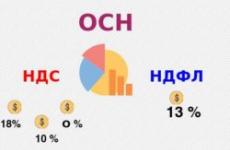The tax is paid at the place of business ip. Do ipd pay
At the word “tax”, many people have not the most pleasant associations, including those of individual entrepreneurs, because, like citizens, they are obliged to share their income with the state. One of the most common taxes that IPs do not like so much is personal income tax, as it directly depends on how much you earned for a specific quarter, month, and year. Many private owners prefer to switch to a special taxation system and transfer only those funds that are fixed, but the PIT (common system) PIT is a mandatory element.
What expenses PI allow to reduce the amount of personal income tax
The personal income tax of an individual entrepreneur is the same income tax, which by analogy can be found in organizations, and it amounts to 13% of all incomes that an entrepreneur receives as an entrepreneur.
It should be understood that it is necessary to include in the objects of taxation, that is, from which money will be charged. Here you need to take into account whether the resident is a country resident or not. If yes, then all domestic and foreign sources, which bring profit to a private trader, will be taxed, and if not, the income tax for individual entrepreneurs will be removed only from the profit that is received in Russia.
It is not at all strange that the entrepreneur will look for any ways to reduce the level of tax payments to the treasury and, fortunately, there are quite legal ways for this. Despite the fact that income tax PI should be calculated on the basis of profit, the volume itself can be significantly reduced due to special deductions. They are provided by the Tax Code of the Russian Federation and are associated with the conduct of the direct activities of the individual entrepreneur:
- costs that are associated with the production and manufacture of products or goods;
- expenses that are necessary for the maintenance of equipment, for its repair, maintenance;
- expenses that are spent on the development of natural resources;
- expenses that were invested in research and development;
- costs associated with the sale of products, goods, provision of services, works;
- the cost of labor to its employees (personal income tax of individual entrepreneurs without employees is not taken into account);
- expenses related to payments to non-state funds, such as the FIU, FSS;
- other expenses that are subject to the law.
Thus, personal income tax can be greatly reduced if the entrepreneur carefully calculates all existing opportunities to reduce the amount. It is necessary to pay special attention to the fact that there is no exact list of expenses as such, therefore it is possible to include quite a lot of categories in it.
NDFL in the activities of IP: Video
What incomes SP are subject to personal income tax
Already there is no question of whether the individual entrepreneur pays personal income tax, the answer is clear - they pay, but what exactly is considered income? An entrepreneur must always remember that he is not just a private owner and businessman, but also a separate, non-activity person who also has the right to his own life outside of work. Of course, this person also has to pay some kind of tax on goods or services received, but this already concerns not so much the IP, as another tax agent.
It turns out that income taxation individual entrepreneurs is carried out only in the area where a person is considered an entrepreneur and conducts direct activities. On the other hand, there may be situations when the SP is obliged to pay the tax as an ordinary citizen, and not the SP. So, in the personal income tax of the entrepreneur are not included such fees:
- tax from the amount that a citizen receives after the sale of real estate or other property;
- tax on winnings paid to the winner by lottery organizers;
- tax on income, which is paid as a reward to the heirs of authors in science, art, creativity, etc .;
- tax on income that was transferred to the property as a result of a deed of gift.
Thus, the payment of personal income tax by individual entrepreneurs is a mandatory procedure on the general system of taxation. Of course, this and in other modes, but there, as a rule, the general concrete is put up for payment. On the other hand, if you have already chosen OSN for yourself, and it is much more profitable for you, then, using deductions for expenses, you can reduce the personal income tax to a minimum, and increase profits to a maximum.
What are the rules for paying personal income tax for individual entrepreneurs? What is it worth knowing about this type of tax in 2017 - how is the calculation carried out, when and by whom is it calculated and paid, what is the procedure for transferring to ESS and STS?
It is necessary to find out whether the individual entrepreneur should pay personal income tax for himself at the initial stages of his business in order to avoid any unpleasant surprises in the future.
What you need to know
The payment of the tax on the income of an individual must be made by persons who belong to the category of payers.
Who is obliged to contribute such sums to the state treasury and from which revenues? Consider, what regulations should be guided in the calculation and payment of tax.
Payers
Payers of personal income tax include physical persons who are:
Taxable income
Profit that is taxed:
- employee salary;
- material aid;
- winnings;
- a gift in financial or in kind;
- dividends;
- the income that citizens receive when carrying out transactions with property objects;
- single payments in accordance with.
Subject to personal income tax and profits, which receive PI in the conduct of business. For some types of profit, individuals report to the tax authorities independently, for others, employers do it for them.
Entrepreneurs are also required to report themselves. If a citizen has a profit in physical terms, it will be assessed at the average market price including value added tax.
The profit that is exempt from taxation is reflected in c.
Current regulatory framework
Payers should be guided by such legislative documents:
- Tax code, .
- which approved for fixing these taxpayers.
- - approved.
Does the IE PIT pay?
Individual entrepreneur pays personal income tax both for himself and for his employees. What features should be considered?
For yourself (without workers)
An entrepreneur cannot conclude and pay his salary. So how is the personal income tax of such a person taxed?
Such accounting is carried out with the help on the basis of which the tax base is determined.
For tax period entrepreneurs must transfer advance tax amounts, the calculation of which is given in Art. 227 p. 8 NK.
The sum will be calculated by the Tax Inspectorate on the basis of:
- data recorded in tax return;
- the amount of profit that was received in the previous tax period.
The amounts payable will be indicated in the tax notice, which the representative of the authorized structures will send to the individual.
The tax itself is calculated at the end of the year. This will take into account all the profits that the individual entrepreneur received in the tax period () minus the advances listed.
The rates that the payer uses when calculating personal income tax are 9, 13, 30, 35%. If the person is a resident, then the rate of 13% is used, non-residents pay 30%.
To calculate personal income tax amount PI should by the same rules as individuals. Tax period is a calendar year.
If the total figures of the amounts at the end of the year are less than the advances, then the balance will be credited against the forthcoming payment ().
The tax base is the profit of IP in cash and in kind, with deduction:
- material costs;
- depreciation deductions;
- the cost of the work of hired staff;
- other costs.
If costs are presented in foreign currency, they should be converted into rubles at the current exchange rate at the time of actual costs incurred.
This type of reporting is also submitted during the liquidation of an enterprise within 5 days from the time when business is discontinued. The entrepreneur also serves on the estimated income.
A person calculates in advance how much he can receive in a year, and on the basis of such calculations submit reports to the tax structures. But if costs exceed income, the amount of personal income tax will be 0.
In this case, served zero declaration. With negative indicators, the right to transfer sums to transfer taxes in the next year does not arise.
How to calculate the amount?
If the calculation will be carried out by an entrepreneur to determine the amount payable from the profits of employees, you will need to use the following formula:
The resulting amount should be rounded up to whole rubles. If there was an overpayment, then there is an opportunity to make its return, provided that the tax period has not yet ended.

After the end of the year, the payer submits an application to the regional branch of the tax authority. When calculating will be considered the information help 2-NDFL, which reflects the funds listed.
If an entrepreneur pays personal income tax for himself, it is worth making calculations according to the following formula:
There are incomes that are not subject to taxation, as well as those for which it is worth using a reduced or increased rate.
So, when calculating it is worth summing up the income in relation to which the same rate is used. That is, the amount of tax is calculated for each group.
Totals summarize. For example:
Calculation example
For example, the profit of IP for the month amounted to 150 thousand rubles. This is the amount received as a result of the provision of its services or the sale of goods, when VAT is taken into account.
Expenses (space rental, staff salaries, utility bills, cost of production) - 80 thousand. We deduct costs from profit and get net income.
It is from this amount that the personal income tax should be calculated:
Entrepreneur uses total bet (13%), then the tax calculation will be like this. Amount to be transferred to the budget:
The person has the right to pay tax every month or quarter. If a person is entitled to a “child’s” deduction, then the calculations will be as follows:
Deadlines for payment
The tax agent amount of personal income tax should be transferred no later than the day when:
- Funds received at a banking institution for the transfer of employees earnings.
- Listed wages from employers to other accounts.
In other cases, tax is paid no later than the day:
It is worth remembering that the tax must be paid in equal parts if a profit is obtained from which the tax agents did not withhold funds:
For myself individual with the status of PI pays:
Where to pay tax?
The amounts of value-added tax presented in the tax return should be transferred at the place of registration of the entrepreneur to the regional tax inspectorate:
- through a banking institution;
- using the online banking system;
- through the cashier in local government.
Frequently asked Questions
Can an entrepreneur be tax agentWhat are the rules for paying tax when using different modes, and what nuances exist when transferring advance payments?
These are the main issues that may arise in the conduct of a businessman.
Is SP a tax agent?
A tax agent is an organization or individual entrepreneur that pays tax for its employees.
That is, if an entrepreneur has employees, he must calculate personal income tax from his income, as well as from the earnings of his staff. Agents duty:
Submit reports on the profits of their employees at the end of the tax period;
withhold and transfer tax from payments made in favor of employees.
Advance payments
During the tax period, the individual entrepreneur must pay an advance amount ().
Payment is made on the basis of a tax notice that comes from the tax authority. That is, calculate personal income tax (advance) the person does not need - for him it will make the representative of the authorized body.
After the calculations, taking into account the required tax deductions will be issued advance payment on income tax of an individual.
Entrepreneurs on the OSNO mode
According to the legislative acts of the Russian Federation, an individual entrepreneur who uses the OSNO must pay personal income tax in several cases.
In fulfilling its obligations on the calculation and payment of tax, it is worth to be guided by Ch. 23 of the Tax Code.
According to Art. 223 NK, IP on the general taxation system uses one of two ways to pay personal income tax:
If the payer does not transfer the amount of the advance payment, it will violate the law. In this case, there will be a need to pay penalties ().
Calculation of advances for individual entrepreneurs on the tax liability is carried out by the regional tax authority, taking into account deductions that are stated in the declaration for the previous period.
After the advance payment has been made, the businessman will receive a notice within a month about the need to pay a certain amount.
If you have not received a notification, you are not required to independently calculate the amount of payments. This is stated in.
We will understand the features of additional payments or refunds. If in the tax period, revenue has changed by more than 50%, then an obligation arises to file statements in the form of a declaration (form 4-NDFL) to adjust the advance amounts.


![]()








A declaration is also submitted if new activities (which are contained in the EGRIP) have arisen. In this case, the PI must independently determine the expected profit and reflects it in the notices.
At the end of the tax period, the entrepreneur submits a declaration to Tax Inspectorate until April 30th.
The SP on the OSNO may act as a tax agent.
In accordance with legal regulations, he must retain in the salary of workers 13 or 30%. Certificates form 2-NDFL are transferred to the authorized structures.
Payments are made no later than the next day after making payments to employees (document dated March 14, 2013 No. 03–0405 / 8-216).
In accordance with Art. 220 NK, a businessman on the general system can use tax deductions with respect to the taxable profit.
Social deduction is possible if there are costs:
- on a voluntary type of insurance;
- charitable contributions;
- treatment;
- for education.
If at the end of the year it turned out that the activity was unprofitable, the tax reduction cannot be carried out.
How to be simplified (USN)?
Payers that use the simplified tax regime should not calculate and pay personal income tax from the income that they received when entrepreneurial species activities.
Will not be taxed amounts that the person received as a result of operations on those activities that are reflected in the registration and entered in the EGRIP.
The income that the entrepreneur received on the UPDF from the transaction, which is not stipulated in the EGRIP, will be taxed at a rate of 13%.
The SP has the right to use tax deductions and reduce the size tax base. Simplified businessman must pay personal income tax:
- From the income in the form of a cash or material prize, which was received when participating in an advertising campaign, which was carried out by the seller of the goods for winnings of more than 4 thousand rubles.
- From the income that was formed when you receive a loan. If loans are made in rubles, the amount is calculated at 2/3 of the refinancing rate, from which cash equivalents of interest are subtracted. If the loans are in foreign currency, the benefit is calculated as 9% of the annual amount, from which the interest is taken away, which is stated in,.
- From the income that was received in the form of interest on the bank deposit.
- From income that was received from a foreign source.
- With dividends (with the participation of third-party companies).
- From the amounts for which the tax was not previously withheld according to.
Simplified employers also pay personal income tax on the salaries of their employees. 13% are deducted from residents, from foreign citizens who work under a labor or civil law contract within the country - 30%.
The amount of pension tax for individual entrepreneurs in 2017
Taxes from individual entrepreneurs in 2017 to the FIU come with the use of subsidies.
The authorities have introduced bills that will at least partially reduce the mass liquidation of enterprises due to the growth of payments in recent years.
Video: we consider the income tax of individual entrepreneurs and limited liability companies, income tax and personal income tax on business income
From 2017, tax authorities should send data to the Pension Fund of the Russian Federation on the profit of individual entrepreneurs for every 6 months.
This is necessary for the formation of forecasts of annual budget revenues. Based on this, a plan and direction of work of state structures will be drawn up.
Since the beginning of 2014, a regulation has come into force, which states that the entrepreneur is obliged to deal with contributions independently.
It is worth being guided by such rules:
Charges paid to the Pension Fund in 2017 is a part of the taxable income. Income may be different, therefore certain standards are provided:
- The profit of IP on OSNO is subject to personal income tax.
- Income simplists go to interest rates excluding costs. Net profit is not important here, as in the calculation of the tax will play the role of turnover.
- At the entrepreneur on UTII taxation carried out in respect of imputed income. The calculation is made according to the formula, which takes into account the physical indicator, the basic profitability and the correction factor.
- When paying fees to the FIU, an entrepreneur on the PSN should consider the limits that are set by the regional authorities.
- When combining several modes of profit businessman must be summed up.
In addition, it is necessary to pay an annual fixed amount of insurance premiums. With a minimum production volume, the amount payable to the FIU in 2017 is 20,727 rubles.
When exceeding the amount of profit limit 300 thousand rubles. Payment should not be made until the end of the tax period, but before April next year.
Basic taxes are also not paid immediately. The entrepreneur is given 3 months to pay interest. The value of the contribution can not exceed 142,026 rubles.
Payments to the Pension Fund are mandatory. It does not matter whether the entrepreneur carries out activities or not.
The obligation to transfer such amounts is lost when you deregister from a tax authority or if you are unable to conduct activities (when taking maternity leave, recruiting to the army).
If the SP has employees, insurance payments are made on them. If such an obligation is not fulfilled, the entrepreneur is brought to administrative types of responsibility - fines, arrests of the entrepreneur’s current account.
Should I submit reports to the Pension Fund? If the SP has workers it will have to report. In the same case, when contributions are paid only for themselves, the need to submit documentation is not necessary.
In the presence of hired personnel, the SP must submit:
- personal account information for each person;
- calculation on charges.
What rules and terms to focus on when paying personal income tax will depend on whether the individual entrepreneur or his employees pay for themselves.
If you encounter difficulties, look for answers in Tax codewhere all the nuances are worth knowing.
Individual entrepreneurs (PI) pay personal income tax in two cases:
for yourself - from the amount of income received from business activities;
for employees - from the amount of remuneration paid.
For themselves NDFL pay PI, applying common system taxation, and since 2016 all employers also pass.
The entrepreneur calculates the amount of income tax in a special order.
From the beginning of the year, the entrepreneur calculates the estimated income for the current year. Then the amount of tax payable in installments during the year is calculated.
After the end of the year, the final tax is calculated, taking into account the income actually received. For income from entrepreneurial activity a rate of 13% is applied (paragraph 1 of Article 224 of the Tax Code of the Russian Federation).
Calculation of the amounts of advance payments
During the year, the entrepreneur pays advance tax payments, which are calculated at the beginning of the year.
The calculation of the amounts of advance payments is carried out by the tax authority on the basis of the actual income received in the previous year minus professional and standard tax deductions.
Example 1.
IP Sazonov A.A. in 2011, received income from the activities of the entrepreneur in the amount of 100 thousand rubles. The costs associated with the extraction of income amounted to amounted to 60 thousand rubles.
The amount of advance payments for 2012 will amount to 5.2 thousand rubles. ((100 thousand rubles. - 60 thousand rubles.) X 13%).
In the event that an entrepreneur has new business income during the year, he must submit a 4-NDFL tax return to the IFTS. The declaration is submitted within five days after the expiration of one month from the date of receipt of income. The entrepreneur determines the amount of income independently.
Example 2 . SP received a new income on May 12, 2012. To submit the declaration 4 personal income tax he must until June 17, 2012.
If the entrepreneur's income has significantly increased or decreased (more than 50%), the taxpayer must submit to the IFTS a new tax return with the amounts of the estimated income in the current year. Then the tax inspector will recalculate the amounts of advance payments (paragraph 10 of article 227 of the Tax Code of the Russian Federation).
Payment NDFL IP
The tax authority issues a tax notification to the entrepreneur personally on receipt, sends by mail by registered mail or in electronic form. Entrepreneur who did not receive tax notice, advance payments can not pay (letter of the Ministry of Finance of the Russian Federation No. 03-04-05 / 3-266 of April 15, 2011).
Advance payments are paid in time:
January - June 50% of the annual amount until July 15;
for July - September 25% of the annual amount until October 15;
for October - December 25% of the annual amount until January 15.
Example 3 . IP Sazonov A.A. from example 1 must pay 2,6 thousand rubles. until July 15, 1,3 thousand rubles. - until October 15, 1,3 thousand rubles. - until January 15.
The final tax payment for the previous year must be no later than July 15 of the following year. At the same time, paid advance payments and tax amounts withheld and transferred by tax agents are taken into account.
Tax return
The IE on the OSNO must submit to the tax authority at the place of registration until April 30 of the following year a personal income tax declaration (Form No. 3-Personal income tax). Even if an entrepreneur did not receive income from entrepreneurial activity during the year or he does not have the amount of tax to the surcharge, it is still necessary to submit a declaration.
It reflects all income received in the reporting year (from entrepreneurial activity, from labor activity, from property leasing, etc.), as well as statutory deductions (professional, standard, property) (clause 4, article 222). NK RF)
The taxpayer may not reflect in the tax return income that is not subject to taxation and income from which the tax is fully withheld by the tax agent.
If an entrepreneur cannot document expenses, he can use a professional tax deduction in the amount of 20% of income. At the same time, it is not required to confirm the deduction.
In case of termination of business activities to the end calendar year, PI, within five days from the date of liquidation, is required to surrender 3-NDFL to tax authorities. Pay the amount of personal income tax IP is required within 15 days from the date of filing such a declaration.






